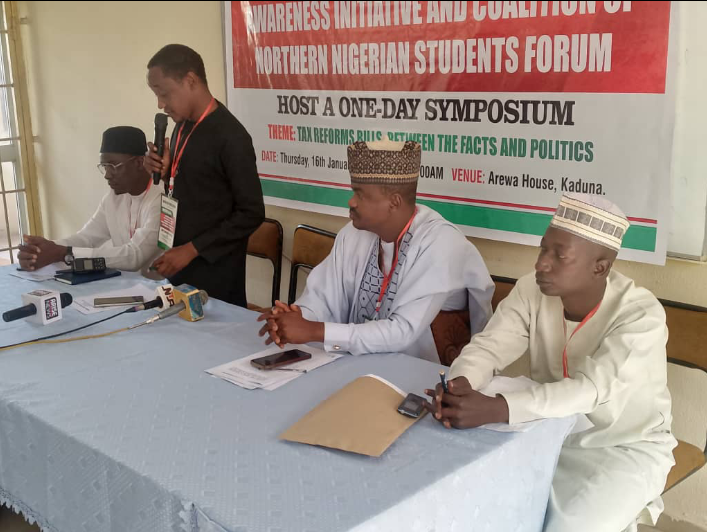
Northern Youth and Community Leaders Call for Constructive Dialogue on Tax Reform Bills
In a pivotal gathering at Arewa House, representatives from various youth groups, student organizations, and civil society entities convened to discuss the contentious tax reform bills currently under consideration by Nigeria’s National Assembly. The symposium, organized by the Nigeria First Project Initiative, Muryar Talaka Awareness Initiative, and the Coalition of Northern Nigerian Students Forum, was held to address the pressing theme: “Tax Reform Bills: Between the Facts and Politics.”
Participants highlighted the significance of public engagement in the democratic process, acknowledging that the discussions surrounding the four tax reform bills proposed by the executive are fundamental to enhancing Nigeria’s revenue base. They noted that, if effectively implemented, the reforms have the potential to diversify the economy, lessen oil dependency, and create a fairer tax system aimed at supporting long-term fiscal stability and sustainable development.
However, the dialogue also illuminated concerns regarding the politicization and regional manipulation surrounding the bills. It was noted that certain political actors are intertwining the debate with personal interests, transforming discussions intended for the betterment of the economy into political battlegrounds ahead of the 2027 general elections. This shift was identified as a distraction from the critical work needed to improve the region’s economic prospects.
The participants reaffirmed Northern Nigeria’s abundant resources—fertile land, rich cultural heritage, and natural assets—as key to achieving economic self-sufficiency. They emphasized the need for visionary leadership to harness these resources effectively, contrasting the region’s potential with its current challenges, which they attributed to leadership failures at the sub-national level.
As the discussions drew to a close, the group urged the public to remain vigilant and engaged, calling for constructive participation in the upcoming public hearings on the tax bills. They emphasized that divisive political rhetoric should be dismissed in favor of collaborative dialogue aimed at uplifting the region.
Participants also praised President Bola Ahmed Tinubu for his initiatives geared toward development, including the establishment of the Ministry of Livestock Development and the creation of the Northwest Development Commission, suggesting that these concepts could lead to improved regional outcomes if effectively implemented.
The gathering culminated in a call for accountability and transparency in governance, particularly from state leaders, asserting that only through committed leadership can Northern Nigeria overcome its economic and social hurdles.
As discussions continue around the tax reform bills, the collective hopes that political actors can redirect their focus from divisive tactics to the potential benefits of the reforms for citizens across Northern Nigeria.
The event’s closing remarks were signed by key organizers, including Comrade Hamza Umar Saulawa, National Coordinator of the Nigeria First Project Initiative, Comrade Bishir Dauda Sabuwar Unguwa Katsina, National Secretary of the Muryar Talaka Awareness Initiative, and Sadi Garba Sadiq, Coordinator of the Coalition of Northern Nigerian Students Forum. In a pivotal gathering at Arewa House, representatives from various youth groups, student organizations, and civil society entities convened to discuss the contentious tax reform bills currently under consideration by Nigeria’s National Assembly. The symposium, organized by the Nigeria First Project Initiative, Muryar Talaka Awareness Initiative, and the Coalition of Northern Nigerian Students Forum, was held to address the pressing theme: “Tax Reform Bills: Between the Facts and Politics.”
Participants highlighted the significance of public engagement in the democratic process, acknowledging that the discussions surrounding the four tax reform bills proposed by the executive are fundamental to enhancing Nigeria’s revenue base. They noted that, if effectively implemented, the reforms have the potential to diversify the economy, lessen oil dependency, and create a fairer tax system aimed at supporting long-term fiscal stability and sustainable development.
However, the dialogue also illuminated concerns regarding the politicization and regional manipulation surrounding the bills. It was noted that certain political actors are intertwining the debate with personal interests, transforming discussions intended for the betterment of the economy into political battlegrounds ahead of the 2027 general elections. This shift was identified as a distraction from the critical work needed to improve the region’s economic prospects.
The participants reaffirmed Northern Nigeria’s abundant resources—fertile land, rich cultural heritage, and natural assets—as key to achieving economic self-sufficiency. They emphasized the need for visionary leadership to harness these resources effectively, contrasting the region’s potential with its current challenges, which they attributed to leadership failures at the sub-national level.
As the discussions drew to a close, the group urged the public to remain vigilant and engaged, calling for constructive participation in the upcoming public hearings on the tax bills. They emphasized that divisive political rhetoric should be dismissed in favor of collaborative dialogue aimed at uplifting the region.
Participants also praised President Bola Ahmed Tinubu for his initiatives geared toward development, including the establishment of the Ministry of Livestock Development and the creation of the Northwest Development Commission, suggesting that these concepts could lead to improved regional outcomes if effectively implemented.
The gathering culminated in a call for accountability and transparency in governance, particularly from state leaders, asserting that only through committed leadership can Northern Nigeria overcome its economic and social hurdles.
As discussions continue around the tax reform bills, the collective hopes that political actors can redirect their focus from divisive tactics to the potential benefits of the reforms for citizens across Northern Nigeria.
The event’s closing remarks were signed by key organizers, including Comrade Hamza Umar Saulawa, National Coordinator of the Nigeria First Project Initiative, Comrade Bishir Dauda Sabuwar Unguwa Katsina, National Secretary of the Muryar Talaka Awareness Initiative, and Sadi Garba Sadiq, Coordinator of the Coalition of Northern Nigerian Students Forum.
